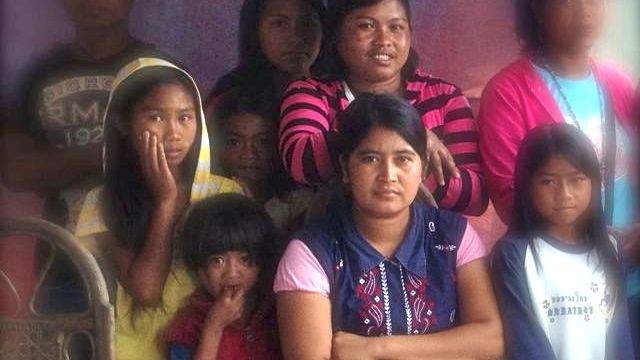SUMMARY
This is AI generated summarization, which may have errors. For context, always refer to the full article.

MANILA, Philippines – On Monday, October 15, Erita Capion, sister of an anti-mining B’laan warrior, came to the head office of the National Commission on Indigenous Peoples (NCIP) in Manila all the way from Tampakan, South Cotabato to complain about the alleged killings and other human rights violations being committed by the military and the mining company operating in her village.
Two of her brothers-in-law were already killed. Her brothers are being hunted by authorities.
“Ang issues doon sa amin, mining. Ang ginagawa doon sa amin, maraming military,” Erita told Rappler in an interview on October 15. (Our issues in our community involve mining and the presence of the military)
A few days after she returned to her village, Erita’s sister-in-law and two of her nephews were killed in a reported military raid in the village of Bong Mal in Tampakan, South Cotabao. Her niece was wounded.
At sunrise Thursday, October 18, the soldiers of the 27th Infantry Battalion of the Philippine Army “strafed” the house of Erita’s brother, Daguil Capion, killing Capion’s 27-year old wife, Juvy and his sons, Pop Capion, 13, and John, 8, Erita told Rappler.
According to Erita, at around 6:30 am, gunfire echoed across the quiet mountainous village, about 3 hours away from Koronadal, the capital of South Cotabato.
“Pumasok kami [sa bahay], sumigaw kaming mga babae. Bakit dinadamay ang mga bata? Ang magulang kong babae, talagang sumisigaw siya. Yung militar, pinatay ang mga bata nang walang awa.“
(We entered the house. The women were crying, ‘Why did you include the children?’ My mother was really crying. The military killed the children without mercy.”
Brains and blood were splattered all over when they entered the house, Erita said, adding that they could no longer recognize the faces of their dead relatives.
The military did not allow them to claim the remains of those who were killed. They brought the bodies outside the house and left them lying sprawled on the ground, Erita said.
“Kinuha nila ang mga patay, linabas. Hindi iyan maari sa aming tradisyon,” Erita said. (They brought the bodies out of the house. It’s not allowed in our tradition.)
“Kala ko ang batas niyo para sa katawhan. Ang batas niyo ay pumapatay sa mga bata at mga babae,” Erita lamented. (I thought your law was for the people. Your law kills children and women.)
Encounter or massacre?
The military however claimed that what happened was an encounter between the group of Erita’s anti-mining tribal warrior-brother Daguil and government troops.
Reports said that Lt Col Alexis Noel Bravo claimed that members of the Army’s 27th Infantry Battalion were attacked by armed men suspected to be Daguil’s group as the troops arrived in Sitio Alyong, Barangay Kimlawis in the town of Kiblawan del Sur. Bravo said the Army soldiers were responding to reports that the tribal leader was in the area.
Erita belied the military’s claim, saying that troops were already in their community hours before the killings. She said she and her fellow B’laans saw three 6×6 army vehicles arrive as early as 2 am of October 18.
Eking Freay, a sitio leader in Bong Mal, also said he saw the military vehicles arriving in their area in the early hours of Thursday, October 18.
He said fear now prevails in the conflict-torn village that sits on rich deposits of gold and copper.
“Ang mga tao sa B’laan [tribe], iyong mga tao hindi nakakapasok. Nagagalit ang mga sundalo. Sabi sa kanila, huwag [kunin] yung mga patay. Sabi sa tribo, huwag kayong mag-report sa media,” Eking told Rappler.
(The B’laan tribe members can’t enter the village. The soldiers are mad. Soldiers did not allow tribe members to retrieve the bodies. They told the tribe not to report the incident to the media).
Mining resistance
According to Erita, the B’laan community has long been opposing the mining operations in their ancestral land. She asserted that her tribe did not give any free, prior and informed consent to the mining operation of Sagittarius Mines Inc (SMI).
Daguil is being accused of leading a group of armed B’laan men who launched attacks against the mining company.
He is also the nephew of another tribal leader Gorelmin Malid, who fiercely opposed the presence of Western Mining Corporation (WMC). Gorelmin was himself killed in 2002.
Daguil has reportedly owned up to at least two armed attacks that claimed the lives of at least two SMI security guards and 3 drilling contractors.
SMI is the local operator of the $6-billion Tampakan mine, which is owned by UK-based Xstrata Plc and Australian miner Indophil Resources.
The B’laan community’s ancestral domain is part of the Tampakan mining project which covers the towns of Tampakan in South Cotabato and Columbio in Sultan Kudarat.
SMI’s mining areas, located in the triboundaries of South Cotabato, Davao del Sur, and Sarangani provinces, are covered by at least 5 ancestral domain claims that belong mostly to the B’laan tribe.
“The community has long been opposed to mining in their area. In their fight to protect their right to self-determination, lives have been sacrificed. They suffer militarization, harassment, and vilification in their assertion of their rights to land, way of life, and peaceful existence,” the Legal Rights and Natural Resources Center (LRC-KSK- FOEI) said in a statement condemning the killings.
Members of the B’laan community attended the symbolic “State of the Indigenous Peoples Address (SIPA)” held in October 15, in observance of the Indigenous Peoples’ Month of October. The indigenous peoples called upon the NCIP, Commission on Human Rights, and the Department of Environment and Natural Resources to probe the alleged human rights violations committed in their communities. – Rappler.com
Add a comment
How does this make you feel?
There are no comments yet. Add your comment to start the conversation.